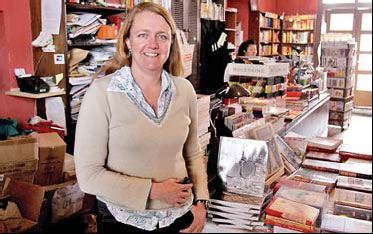People
A new chapter for literary festivals
Updated: 2011-03-04 07:59
By Chitralekha Basu (China Daily)
|
Alex Pearson, managing director of The Bookworm, is pleased with the rapid growth of the literary festival. Jiang Dong / China Daily |
International literary festivals in China in February and March are growing in number, size and the range of authors, and the diverse cultures they come from.
Performance poetry and gourmand feasts are being added to up the entertainment quotient. Quizzes, translation slams and cabarets celebrate the glory of the written word and extend its ambit.
The first Capital M Festival started on Feb 26, adding to the kitty of five thriving annual literary do's in Beijing, Shanghai, Hong Kong, Sichuan's provincial capital Chengdu and Jiangsu's Suzhou city.
So, why have another show in Beijing, where the Bookworm International Literary Festival (BILF) - now in its fifth year and firmly ensconced on the world map of noted international literary festivals - is hosting 74 authors from 19 countries and more than 100 events?
"There's always room for more than one literary festival in cities the size of Beijing and Shanghai," says Tina Kanagaratnam, organizer-in-chief of the M Literary Festival, which started nine years ago in Shanghai.
"We are getting 30 of the 85 authors coming to our Shanghai festival to go to Beijing to take part in 15 events."
This might create a tough choice for literary festival junkies - and there are quite a few, judging by the pace at which tickets sold out to events featuring authors Bi Feiyu (Moon Opera, Three Sisters) and Peter Hessler (River Town, Country Driving).
Even as the country burns with literary festival fever and planeloads of authors arrive from Turin, Jerusalem and New South Wales, it is evident that Chinese authors are ready for international attention. And writers from around the globe are ready to engage with China.
"We've tried to strike a balance between three groups, while putting together our Chinese authors' list," BILF founder Alex Pearson says.
She started the festival in her modest bookstore-cum-lending library with just 15 authors five years ago. Its profile has since grown staggeringly in terms of stature and glamor.
This year's BILF features the up-and-coming, including novelists Zhang Yueran and Sheng Keyi, and crime writer A Yi; the very new, such as Mian Mian and Chun Shu, who write coming-of-age novels set against urban angst; and the well-established, including heavyweight novelists Yan Lianke and Bi Feiyu, poet Xi Chuan, and children's fiction-writer Yang Hongying.
It will introduce e-writers, such as Hu Xudong, and sci-fi writers, including Han Song and Pan Haitian.
"The idea is to show our international audience and guests how literature is being created, in China in particular," Pearson says.
BILF's director Kadi Hughes says, "This is a chance for Chinese authors to put themselves on the radar of those who read in English. We're introducing newer voices in Chinese literature, hoping they will be picked up by translators, agents and publishers."
China has become the new hot destination for authors doing the festival circuit.
"Every writer I know from somewhere else wants to come to Beijing," says Man Asian Award short-listed novelist Xu Xi, who lives in New York, Hong Kong and New Zealand.
Foreign authors' engagement with China is often sustained beyond their initial curiosities. Jonathan Watts (When a Billion Chinese Jump), Peter Hessler, Leslie T. Chang (Factory Girls), Pallavi Aiyer (Smoke and Mirrors, Chinese Whiskers), came to China as journalists. But they eventually wrote a China book or three, based on their close encounters with a complex, multidimensional and often unknowable culture.
Indian novelist Amitav Ghosh, the star of BILF in 2010, returns this year to speak in Shanghai and Hong Kong.
Hong Kong Literary Festival board of directors chair Douglas Kerr says, "The whole world has become keen to learn about China, and this is reflected in the number of writers who come here from overseas. Amitav Ghosh, of course, is bringing the characters of his forthcoming book (the sequel to Sea of Poppies) to this part of the world - so no doubt he has an extra incentive."
In this moment, "when China is becoming everybody's business", as Kerr puts it, literary festival organizers have their work cut out for them.
"What we are enjoying as a literary festival is the increasing scope of international attention on China, and the greater provision for cultural exchanges and debate that this allows for," M Literary Festival coordinator Amanda Palin says.
China's second-tier cities have their own distinctions as festival hosts.
"Authors say they love coming to Suzhou and Chengdu, partly because (they're) less frenetic than other festivals," says Peter Goff, who runs BILF in these destinations.
"They're all interested in the emergence and development of China. That's a big story, and these cities present very different facets to that narrative."
Literary festivals in China are "more of a social occasion", writer and avid festival-watcher Janet Roberts says.
"It is suggested by the offers of wine and food with the event."
They're also occasions to "simply benefit from stimulating creative dialogue with the writers", Roberts says.
"If it weren't for the BILF and M literary festivals, I would probably not remain in China."
Specials

'Super moon'
The "Super Moon" arrives at its closest point to the Earth in 2011.

Radiation test
The probability of being exposed to a life-threatening level of radiation is quite slim.

Panic buying of salt
Worried Chinese shoppers stripped stores of salt on radiation fears.
